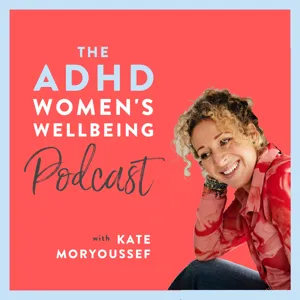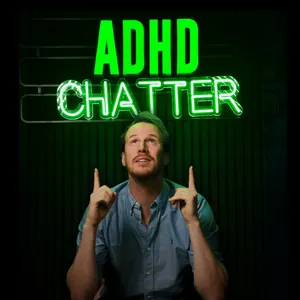Podcast Summary
Understanding Default Mode Network (DMN) in ADHD: Individuals with ADHD can benefit from understanding the DMN's impact, and through neuroplasticity, can improve their thought patterns and live a fulfilled life
Understanding the Default Mode Network (DMN) and its impact on individuals with ADHD can provide valuable insights into thriving with the condition. Renowned psychiatrist and ADHD expert, Dr. Ned Hallowell, explains this concept in detail, emphasizing that despite the DMN's powerful presence in ADHD, individuals have the ability to help themselves by rewiring their thought patterns. This process, known as neuroplasticity, offers various options including medication and self-help techniques. Dr. Hallowell's expertise, combined with Kate Moore Yousef's personal reflections from a workshop with him, provides a practical and insightful perspective on living a fulfilled life with ADHD. For those interested in learning more, Dr. Hallowell's new book, ADHD 2.0, is highly recommended.
Embracing the Advantages of ADHD: ADHD is not a deficit or disorder, but a trait with potential advantages. Successful individuals, including entrepreneurs and Nobel Prize winners, have it. Embrace the differences and unique qualities.
The label of having Attention Deficit Hyperactivity Disorder (ADHD) should not be seen as a deficit or a disorder, but rather as a trait with potential advantages. The speaker, who has ADHD, shares how his exploration of this field led him to realize that the medical model of ADHD leaves out the good parts. He emphasizes that people with ADHD are often highly intelligent and capable, and that many successful individuals, including entrepreneurs and Nobel Prize winners, have it. The negative effects come from the stigma and self-criticism associated with the label, rather than the condition itself. The speaker encourages embracing the differences and unique qualities that come with ADHD, rather than trying to conform to a norm.
The DMN: A Gift and Curse for Individuals with ADD: Individuals with ADD can harness the power of their Default Mode Network (DMN) for creativity, but must also learn to redirect focus when it sends negative messages, using techniques like gratitude, visualization, physical activities, or engaging in different conversations.
The Default Mode Network (DMN), a part of our imagination, can be both a gift and a curse for individuals with ADD. While it allows us to imagine and arrange, it also sends negative messages, amplifying feelings of rejection and self-doubt. The DMN thrives on our attention, making it essential to redirect our focus when we notice its negative influence. Techniques like gratitude, visualization, physical activities, or engaging in different conversations can help redirect our attention and shut down the DMN. Ultimately, understanding the DMN and learning to manage it can help individuals with ADD overcome self-criticism and make the most of their imagination.
Finding the right difficult for people with ADHD: Focusing on meaningful activities that challenge individuals with ADHD can significantly improve their lives, rather than solely focusing on executive function skills
People with ADHD can effectively manage their symptoms by finding activities that are both difficult and meaningful to them. These activities serve as an outlet for their strongest drives – the desire to be free and the desire to build and create. While executive functions skills like organization and time management are important, they are not the most impactful interventions for those with ADHD. Instead, focusing on finding the right difficult, whether it's a job, a mission, or a creative outlet, can make a significant difference in one's life. It's essential to prioritize what truly matters and not get bogged down in trying to improve areas that are less important in the grand scheme of things. Additionally, being well enough organized to reach goals is a more achievable and productive goal than striving for perfection.
The Power of Connection: Embrace It for a Fulfilling Life: Connection is essential for our well-being and can lead to greatness. People with ADHD have unique strengths to offer, but must embrace living with purpose to fully benefit from their abilities.
Connection, whether visible or invisible, is a powerful and essential component of our lives. It's free, fun, and beneficial for our well-being. The speaker emphasizes the importance of connection in writing, creating, and serving a purpose, and how it can lead to greatness. People with ADHD, in particular, are uniquely positioned to help others due to their empathy and inner drive to live with purpose. However, they also have the potential to be self-absorbed and introspective. Embracing the unique aspects of ourselves and living with purpose can lead to a fulfilling life. The speaker also emphasizes the importance of having a habitual vision of greatness, which involves helping others and improving the world. Connection is a vital network that grows when we water it, weed it, and take care of it, much like a garden.
Discovering purpose and helping others improves life with ADHD: Personal growth and serving others can alleviate ADHD symptoms, with resources available for women online.
Living with purpose and helping others can positively impact one's own life, even for those with ADHD. The speaker shares her personal journey of feeling the call to serve but unable to do so due to caring for young children. Once she began her training and coaching, she discovered her true passion and noticed a significant improvement in her ADHD symptoms. She now aims to provide resources and knowledge for others dealing with ADHD, particularly women, through her website. These resources cover various topics, including the impact of hormones on ADHD and ways to manage energy and burnout. The speaker's mission is to help others understand their ADHD, embrace their authenticity, and thrive in their personal and professional lives.
ADHD and the Default Mode Network: People with ADHD have a larger DMN, leading to imaginative thinking but also excessive rumination and negative thoughts. Awareness and balance between DMN and TPN can help manage thoughts and emotions.
Individuals with ADHD have a more profound default mode network (DMN) than neurotypical people, which can be both a gift and a curse. The DMN is responsible for imaginative and creative thinking, but for those with ADHD, it can also lead to excessive rumination, self-criticism, and negative thinking. This "glitchy switch" can make it difficult to maintain focus and equilibrium, leading to mental health issues. While we cannot change this aspect of our brain, we can be aware of it and work to bring more balance between our DMN and task-positive network (TPN), allowing us to better manage our thoughts and emotions.
Accessing the default mode network with EFT: EFT helps shift thinking, acknowledge negative thoughts, move through them, and return to a balanced state. Practice gratitude, journaling, and connect with supportive people to stay grounded in reality and manage anxiety and negative thoughts effectively.
Emotional Freedom Technique (EFT), or tapping, helps individuals with ADHD shift their thinking by accessing the default mode network (DMN) in the brain. This process allows us to acknowledge negative thoughts, move through them, and return to a balanced state. It's essential to learn how to pay attention to the positive aspects of life and let go of resentment and negative rumination. Practicing gratitude, journaling, and connecting with supportive people can help us stay grounded in reality and outsmart our negative thoughts. EFT can be particularly effective in managing anxiety and catastrophizing thoughts, bringing us back to a more balanced perspective. Remember, our imagination can be both a valuable asset and a source of distress. By understanding the power of our thoughts and learning techniques like EFT, we can empower ourselves to live our lives more fully and positively.
Practicing EFT to address anxious thoughts and feelings: Identifying and acknowledging anxious thoughts and feelings through EFT can help reduce stress, gain perspective, and increase resilience, ultimately leading to a more positive outlook and better coping skills.
Acknowledging and addressing anxious thoughts and feelings through the practice of Emotional Freedom Technique (EFT), also known as tapping, can help reduce stress and anxiety, leading to a more balanced and neutral mindset. By identifying and verbalizing worries, acknowledging their physical manifestations in the body, and allowing the anxious thoughts to pass, individuals can gain perspective and resilience, ultimately leading to a more positive outlook and the ability to cope with potential challenges. EFT is a powerful tool that encourages acceptance and validation of all emotions, rather than dismissing them, and can result in a more equal balance between the analytical and emotional parts of the brain.
Understanding and managing emotions: Acknowledge, accept, and manage emotions through deep breathing and available resources for support and self-growth.
It's natural to experience worries, fears, and anxiety, and acknowledging these emotions is the first step towards managing them. Our brains have a neurological explanation for why we may be prone to negative spiraling and criticism, but we can learn to release these worries and cope. To help with this, practicing deep breathing exercises can be beneficial. The speaker encourages listeners to accept their brains as they are, while also utilizing resources such as her website, workshops, and new Substack to find guidance and support in their self-healing and self-exploration journey. The speaker will be taking a break but will be back soon with new episodes featuring interesting guests and topics. She invites listeners to join her on Substack for quicker updates and resources. Overall, the key takeaway is to acknowledge, accept, and manage emotions, while utilizing available resources for support and self-growth.





